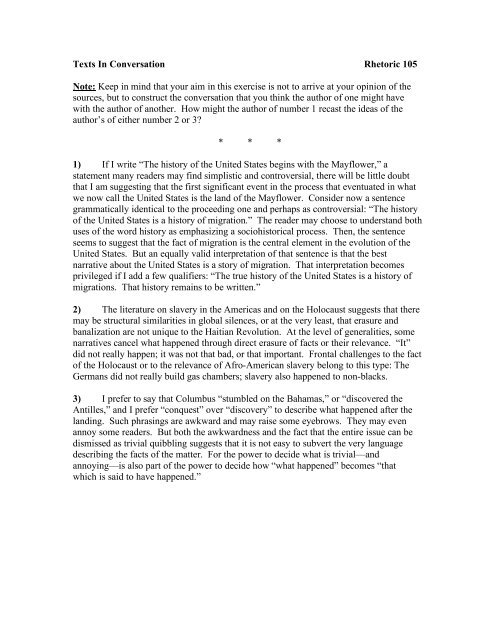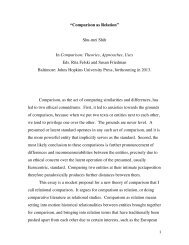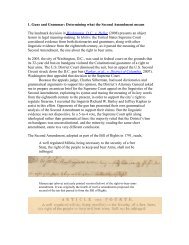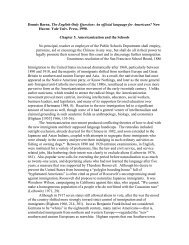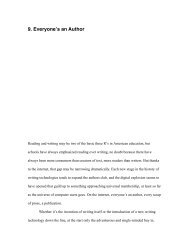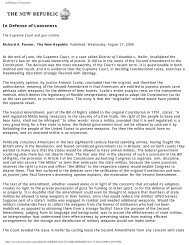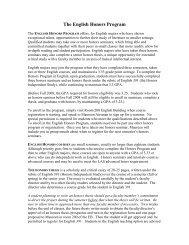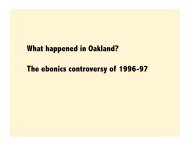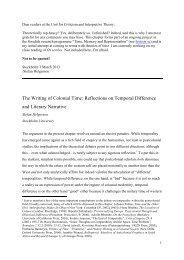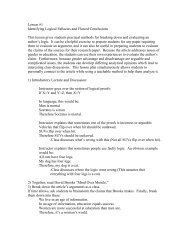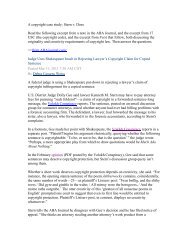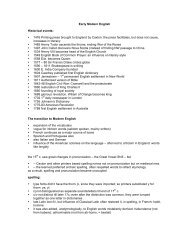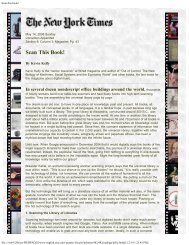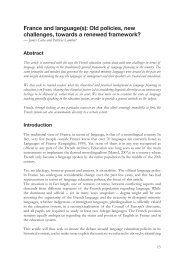It's hard to write a good paper about a bad topic. That's why ... - English
It's hard to write a good paper about a bad topic. That's why ... - English
It's hard to write a good paper about a bad topic. That's why ... - English
You also want an ePaper? Increase the reach of your titles
YUMPU automatically turns print PDFs into web optimized ePapers that Google loves.
Texts In Conversation Rhe<strong>to</strong>ric 105<br />
Note: Keep in mind that your aim in this exercise is not <strong>to</strong> arrive at your opinion of the<br />
sources, but <strong>to</strong> construct the conversation that you think the author of one might have<br />
with the author of another. How might the author of number 1 recast the ideas of the<br />
author’s of either number 2 or 3?<br />
* * *<br />
1) If I <strong>write</strong> “The his<strong>to</strong>ry of the United States begins with the Mayflower,” a<br />
statement many readers may find simplistic and controversial, there will be little doubt<br />
that I am suggesting that the first significant event in the process that eventuated in what<br />
we now call the United States is the land of the Mayflower. Consider now a sentence<br />
grammatically identical <strong>to</strong> the proceeding one and perhaps as controversial: “The his<strong>to</strong>ry<br />
of the United States is a his<strong>to</strong>ry of migration.” The reader may choose <strong>to</strong> understand both<br />
uses of the word his<strong>to</strong>ry as emphasizing a sociohis<strong>to</strong>rical process. Then, the sentence<br />
seems <strong>to</strong> suggest that the fact of migration is the central element in the evolution of the<br />
United States. But an equally valid interpretation of that sentence is that the best<br />
narrative <strong>about</strong> the United States is a s<strong>to</strong>ry of migration. That interpretation becomes<br />
privileged if I add a few qualifiers: “The true his<strong>to</strong>ry of the United States is a his<strong>to</strong>ry of<br />
migrations. That his<strong>to</strong>ry remains <strong>to</strong> be written.”<br />
2) The literature on slavery in the Americas and on the Holocaust suggests that there<br />
may be structural similarities in global silences, or at the very least, that erasure and<br />
banalization are not unique <strong>to</strong> the Haitian Revolution. At the level of generalities, some<br />
narratives cancel what happened through direct erasure of facts or their relevance. “It”<br />
did not really happen; it was not that <strong>bad</strong>, or that important. Frontal challenges <strong>to</strong> the fact<br />
of the Holocaust or <strong>to</strong> the relevance of Afro-American slavery belong <strong>to</strong> this type: The<br />
Germans did not really build gas chambers; slavery also happened <strong>to</strong> non-blacks.<br />
3) I prefer <strong>to</strong> say that Columbus “stumbled on the Bahamas,” or “discovered the<br />
Antilles,” and I prefer “conquest” over “discovery” <strong>to</strong> describe what happened after the<br />
landing. Such phrasings are awkward and may raise some eyebrows. They may even<br />
annoy some readers. But both the awkwardness and the fact that the entire issue can be<br />
dismissed as trivial quibbling suggests that it is not easy <strong>to</strong> subvert the very language<br />
describing the facts of the matter. For the power <strong>to</strong> decide what is trivial—and<br />
annoying—is also part of the power <strong>to</strong> decide how “what happened” becomes “that<br />
which is said <strong>to</strong> have happened.”


